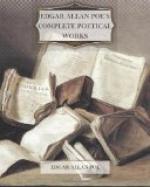IV. Ye deliverers of Athens
from shame!
Ye avengers of Liberty’s wrongs!
Endless ages shall cherish your fame,
Embalmed in their echoing songs!
1827
* * * * *
DREAMS.
Oh! that my young life were a lasting
dream!
My spirit not awakening, till the beam
Of an Eternity should bring the morrow.
Yes! though that long dream were of hopeless
sorrow,
’Twere better than the cold reality
Of waking life, to him whose heart must
be,
And hath been still, upon the lovely earth,
A chaos of deep passion, from his birth.
But should it be—that dream
eternally
Continuing—as dreams have been
to me
In my young boyhood—should
it thus be given,
’Twere folly still to hope for higher
Heaven.
For I have revelled when the sun was bright
I’ the summer sky, in dreams of
living light
And loveliness,—have left my
very heart
Inclines of my imaginary apart [1]
From mine own home, with beings that have
been
Of mine own thought—what more
could I have seen?
’Twas once—and only once—and
the wild hour
From my remembrance shall not pass—some
power
Or spell had bound me—’twas
the chilly wind
Came o’er me in the night, and left
behind
Its image on my spirit—or the
moon
Shone on my slumbers in her lofty noon
Too coldly—or the stars—howe’er
it was
That dream was that that night-wind—let
it pass.
I have been happy, though in a
dream.
I have been happy—and I love
the theme:
Dreams! in their vivid coloring of life
As in that fleeting, shadowy, misty strife
Of semblance with reality which brings
To the delirious eye, more lovely things
Of Paradise and Love—and all
my own!—
Than young Hope in his sunniest hour hath
known.
[Footnote 1: In climes of mine imagining apart?—Ed.]
* * * * *
“IN YOUTH I HAVE KNOWN ONE.”
How often we forget all time, when lone Admiring Nature’s universal throne; Her woods—her wilds—her mountains—the intense Reply of Hers to Our intelligence!
I. In youth I have known one with whom the
Earth
In
secret communing held—as he with it,
In
daylight, and in beauty, from his birth:
Whose
fervid, flickering torch of life was lit
From
the sun and stars, whence he had drawn forth
A
passionate light such for his spirit was fit—
And
yet that spirit knew—not in the hour
Of
its own fervor—what had o’er it power.




